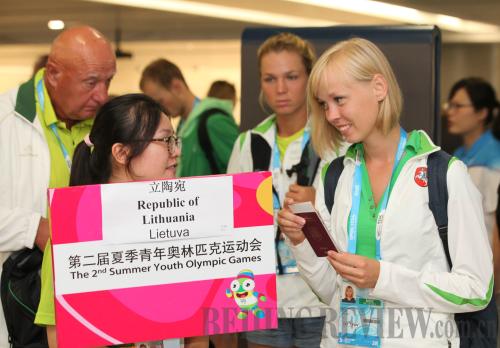|
 |
|
HOSPITABLE HOST: A volunteer offers information services to young Lithuanian athletes arriving at the Lukou International Airport in Nanjing, Jiangsu Province, on August 13. The 2014 Youth Olympic Games will be held in Nanjing on August 16-28 (REN ZHENLAI) |
Better Guarantees
Health authorities announced on August 7 that China will provide all its rural residents with access to medical insurance covering serious diseases in 2015.
By the end of May, the rural residents' major-disease insurance program had been piloted in over half of China's rural county-level regions, and the government is planning to expand it nationwide next year, said Song Shuli, a spokeswoman for the National Health and Family Planning Commission.
Some 300 million rural residents had joined the major-disease insurance program by the end of 2013 and 1.23 million have received payments under it to date.
Song also said that more than 802 million people, or 90 percent of China's rural residents, have joined the basic New Rural Cooperative Medical Program.
Government subsidies for the program increased from the previous 240 yuan ($39) per person each year to 280 yuan ($46) in 2013, she added.
Museum Subsidies
The Chinese Government has allocated 4.96 billion yuan ($806 million) to support free admissions to museums, galleries, memorials and libraries this year.
The funds for 2014 will keep 1,815 museums and memorials, as well as 6,537 galleries, libraries and cultural facilities free, according to the Ministry of Finance on August 11.
The figure is almost the same as 2013, when 5.11 billion yuan ($830 million) was allocated for the same purpose.
Student Nutrition
The Ministry of Finance (MOF) said on August 11 that it has allocated another 16.2 billion yuan ($2.63 billion) in special funds to support a national plan to improve nutrition for rural students this year.
This year's state subsidies to primary and middle school students, 3.2 percent more than a year ago, will go to schools in 699 impoverished counties in 22 provincial-level areas, mainly in central and west China, according to the MOF.
About 32.29 million rural students have benefited from the 46.23-billion-yuan ($7.51 billion) subsidies allocated by the Central Government since 2011, when the nutrition improvement program was launched.
Under the program, which addresses the wealth gap between China's rural areas and its cities, each student will receive 3 yuan ($0.49) per day for meals.
However, China's cities are also in need of nutritional support. About 12 percent of children aged 7-18 years old in China are overweight or obese, according to a survey by the Chinese Medical Doctor Association in 2012. The obesity problem among adults and children is more pronounced in big cities such as Beijing and Shanghai, where people enjoy higher incomes, eat richer foods and lead more sedentary lifestyles. | 